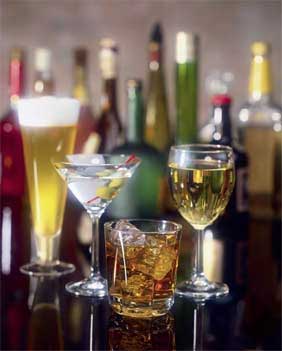The Science of Drink-No-More
 While the faith in science and technology to make our lives better is a constant, it doesn't always play out that way. However, sometimes science comes through. Consider this story:
While the faith in science and technology to make our lives better is a constant, it doesn't always play out that way. However, sometimes science comes through. Consider this story:
DRUG DEVELOPED TO MAKE PEOPLE DRINK LESS
As reported by the Daily Telegraph, this new drug, developed by Lundbeck and currently going through clinical trials, curbs the desire to drink by making it less pleasurable. According to a study conducted the results of using this drug were:
"Over six months in the trial the average amount of alcohol consumed per day reduced from 84g per day – the equivalent to a bottle of wine – to 30g per day or a large glass of wine.The number of days they drank heavily reduced from 19 to seven in those taking the drug alongside counselling."
The single most heartbreaking thing I've witnessed in the 20 years that I've worked in the wine business is the number of people I've come across that are dependant on the product they produce or sell: alcohol. I've witnessed debilitating effects of this problem that can only be called heartbreaking and sad.
That's what makes the development of this new drug, called Nalmefene, such a hopeful event if it eventually comes to market. The Daily Telegraph story goes on to note that the side effects of the drug are dizziness, nausea, fatigue, sleep disorder or insomnia, vomiting, cold-like symptoms or excessive sweating. None of these side effects even begin to rise to the problematic level that alcohol dependence can.
I don't know what the market is for this kind of drug. It is unlikely anywhere near as big as the market for Viagra or Xanax or other happy pills. My concern is that market forces might curtail any urgency to bring this new drug to market.
Those of us in the wine industry and those that work in the beer and spirits industry find ourselves surrounded by alcohol. We have extraordinary access to alcohol. And we find positive messages surrounding drinking a constant. While I've seen no study on this issue, I would not be surprised to learn that those in this industry have a higher rate of alcohol abuse. I'm not a neo-prohibitionist. And I'm not making the case for heightened restrictions on access to alcohol.
I'm merely having my faith in science and technology to provide us with great and useful tools that go beyond streaming video and reconnecting with former high school friends renewed.

Sounds like “Clockwork Orange” …
I’ve had a similar effect from Abilify, and I’m not the only one. It doesn’t give me negative effects (nausea, dizziness, etc) — it simply makes me want to drink less and makes drinking larger quantities less pleasurable. I find I can get the same amount of pleasure from one or two glasses that I used to get out of three or four. I just come to the end of the second glass and think, “Huh. I don’t really want any more.” I suspected this was a side effect of Abilify, Googled it and more or less confirmed it (at least, a lot of other people have reported the same thing). I have to say, it’s nice to be able to enjoy wine without worrying so much about becoming dependent.
This was a blinded trial, which means no one knew whether they were getting active treatment or a dummy pill/placebo. Interestingly, as you mentioned, those on the active drug reduced their drinking from 84g to 30g after 6 months but the placebo group also showed a marked reduction, from 85g to 43g.
The power of placebo treatment can be enormous – the small difference between the active drug and placebo effect may jeopardize this drug from being approved to be sold or reimbursed by insurance companies.
To what are you referring when you stated your concern that “market forces might curtail any urgency to bring this new drug to market”? It seems more likely that government regulators would prevent this drug from reaching the market.
When I refer to market forces I’m only wondering about potential demand versus cost to bring to market.
Using drugs to lessen drinking habits is something alright. What will they come up next I wonder.